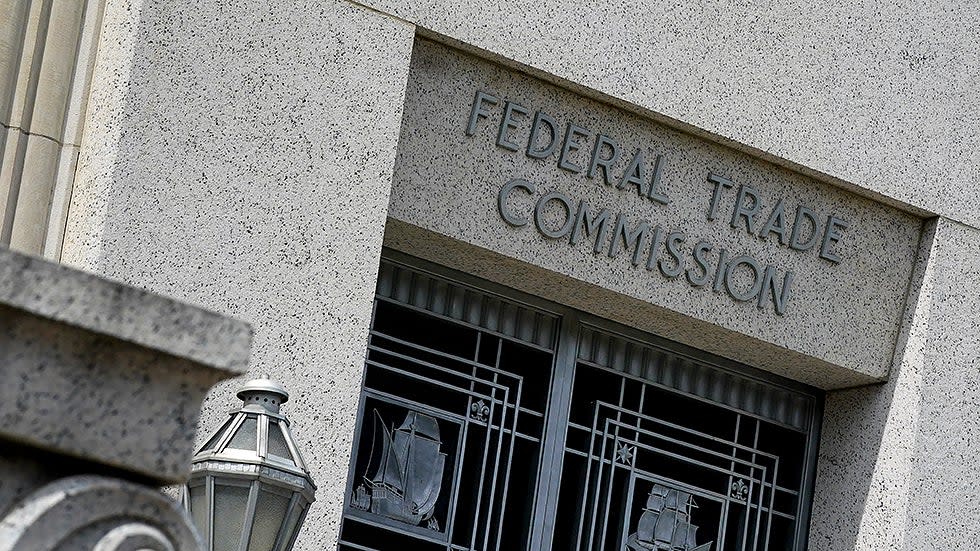Biden administration boosts support for antitrust efforts

The Biden administration is throwing its weight behind efforts to boost antitrust enforcement as federal agencies take on the market power of tech giants.
President Biden's $5.8 trillion budget proposal requests $227 million in increased funding for the Federal Trade Commission (FTC) and the Department of Justice (DOJ) combined - a bump advocates and agency leaders say is needed to tackle cases against the nation's wealthiest companies.
In addition to the request for increased funding, the DOJ sent letters to top lawmakers on the House and Senate Judiciary committees endorsing a key antitrust bill, a move that some advocates said could sway lawmakers who are hesitant to back the seemingly stalled legislation.
"It's very significant and it's definitely a step in the right direction. I think the thing that's been dogging any antitrust enforcement efforts, whether that's at the FTC or the Department of Justice, for decades is really a lack of capacity," Matt Kent, a competition policy advocate at Public Citizen told The Hill.
The DOJ and the FTC enforce antitrust laws, which means that they face dominant companies - not just in the tech industry - with access to some of the best legal representation and monetary resources in the nation.
Advocates say that the boost in funding would put the administration on a more equal playing field with big corporations.
The 2023 budget proposal would increase the DOJ's antitrust division funding by $88 million and the FTC's funding by $139 million.
"It would represent a serious step toward closing the huge funding gap that the agencies confront today," said Daniel Francis, a Harvard Law School lecturer and former deputy director of the FTC competition bureau.
"It would go a long way to help the agencies complete timely evaluations of proposed deals, giving consumers comfort that their interests are being protected, and giving businesses comfort that the agencies have been able to take a real look at transactions before they close," he added.
The additional resources would also help offset what Robyn Shapiro, director of communications at the American Economic Liberties Project, called an "unprecedented merger wave."
"Very simply, the DOJ and the FTC need more money to do their jobs," she said.
One high-profile acquisition, Microsoft's purchase of gaming publisher Activision Blizzard for $70 billion, is under review by the FTC, Bloomberg reported earlier this year. The agencies are also in the middle of active antitrust cases against Google and Facebook.
The funding increase could also help the agencies keep nonmerger investigations moving forward at an "appropriate pace" when they often can "take a back seat" to merger reviews subject to a timed deadline, Francis said.
Biden appointed critics of Big Tech companies to top antitrust roles - naming Lina Khan as director of the FTC and Jonathan Kanter to head the DOJ's antitrust division.
Despite Khan's and Kanter's lofty goals to revamp antitrust enforcement, they are still largely subject to the constraints of their predecessors in terms of resources and existing antitrust law.
"I think the funds are essential for them to pursue a pro-competition environment," said Bill Baer, a visiting fellow at the Brookings Institution and former antitrust head at both the DOJ and FTC.
"Both of them are committed to making sure competition works for everybody," Baer added.
Biden's nomination of Khan and Kanter, along with a sweeping executive order on competition released in July, signaled a tough stance from the administration on market concentration.
But the DOJ's letter to members of Congress backing the American Online Innovation and Choice Act appears to be the most direct step the administration has taken to support specific reform measures weighed in Congress.
"If enacted, we believe that this legislation has the potential to have a positive effect on dynamism in digital markets going forward. Our future global competitiveness depends on innovators and entrepreneurs having the ability to access markets free from dominant incumbents that impede innovation, competition, resiliency, and widespread prosperity," acting Assistant Attorney General Peter Hyun said in the letter.
The proposal would block dominant online companies, determined by user base and revenue, from preferring their own goods or discriminating against rival products on their platforms. The way the bill is written, the definition would likely mean the legislation would apply to Amazon, Apple, Google and Meta, Facebook's parent company.
Baer, who led the DOJ's antitrust division from 2013 to 2016, said the letter is "quite a statement."
"DOJ is very careful about what legislation it chooses to endorse. And the fact that they said these two bills, one in the House, one in the Senate, are important, significant and necessary, is quite a statement," Baer said.
Kent said the DOJ's backing could also "give a real shot in the arm to legislative efforts" on the bill.
Both the House and Senate Judiciary committees advanced versions of the proposal in bipartisan votes, the Senate in January and the House in June.
Despite the bipartisan support, lawmakers on both sides of the aisle have expressed concerns that they said would need to be addressed before supporting it on the floor.
Relatively smaller tech companies, including Yelp, Sonos and Basecamp, have endorsed the legislation. But tech giants and industry groups have forcefully pushed back on the proposal that would rein in their power.
The Computer and Communications Industry Association (CCIA) has come out forcefully against the proposal with an aggressive ad campaign and ramped up criticism Tuesday focused on the DOJ's backing.
"Like a majority of senators on the Judiciary Committee, the Justice Department letter recognizes that the legislation as currently drafted needs changes. However, it remains silent on bipartisan criticisms that this bill is vague and poorly drafted and ignores widespread concerns about the bills' harm to consumers, national security, and global competitiveness," CCIA spokeswoman Chandler Smith Costello said in a statement.

